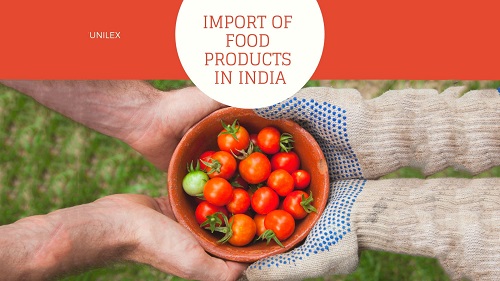Import of food products in India | Documents | Procedure

One of the major developments in the last few decades has been globalization and rapid growth in International trade and business which has resulted in a quantum leap in the imports of various products from diverse countries into India. In India, various food articles cereals, edible oils, sugar are imported in large quantity. Before the commencement of Food safety and standards act, 2006 (FSSA), the import of food articles are imported in India within the purview of the customs act, 1962 and the customs tariff act, 1975, with no specific laws that could govern the major issued related to the import of any food article to India. With the commencement of FSSA, all other existing laws related to food have consolidated and established a single regulatory authority named Food Safety and Standards Authority of India (FSSAI) for laying down the minimum standards for doing any food business and any sort of its import in India.
RESTRICTIONS ON IMPORT INTO INDIA ANY FOOD ARTICLE
A person will not be allowed to import any food article which is unsafe or misbranded or substandard or contains any extraneous matter. No person can import any food article for which food license is required to be obtained under the act before importing the same. No person can import any food article which is in any contravention of any provision of FSSA or any of its rules or regulations.
DOCUMENTS REQUIRED FOR IMPORTING ANY FOOD ARTICLE IN INDIA
Before importing any food product in India, an importer needs to possess the following documents: Import license issued by the Designated Officer/Central Licensing authority of FSSAI Import Export Code (IEC) issued by the Directorate General of Foreign Trade (DGFT) An authority letter of the importer in favor of a Custom House Agent (CHA) addressed to the authorized officer if FSSAI if the import is being handled through CHA. Imported food whose shelf life is not less than 60% at the time of clearance by the custom.
PROCEDURE FOR THE IMPORT OF FOOD ARTICLES INTO INDIA
On arrival of the consignment food at the custom port, the importer shall file an application with the designated officer along with the following documents: Transit country list, the list of countries where the food article had traveled before arriving in India. Special transit conditions like temperature profile report in case of required temperature control Stuffing list Any other document demanded by the authorized officer. Pay the prescribed fee for separate article imported for visual inspection and sampling After verification of the documents, the authorized officer shall intimate the inspection date and time to the importer. At the appointed date and time of the inspection, the authorized officer shall inspect the consignment and lift the required number for the sampling as per the stuffing list submitted. The sample taken will be divided into parts, one will be sent to the food analyst for the analyzing the same and the other will be kept by the authorized officer.
NO OBJECTION CERTIFICATE
The authorized officer shall along with the relevant laboratory analysis report issue a no objection certificate (NOC) to the importer allowing the import of the food in India. Authorized officer shall communicate the details of the NOC to the custom authority as well. The NOC shall state the validity period within which the imported food has to be taken out from the customs area, otherwise the imported food will be treated as untreated food.
FOLLOWING FOOD ARTICLES WILL NOT BE SUBJECT TO INSPECTION/SAMPLING/NOC FROM THE CUSTOMS AUTHORITY
Imported food for personal use upto the quantity allowed for the import. Export consignments and export rejected/re-imported food meant for re-export Food articles/additives imported by manufacturers for their captive use for 100% exports.
SUSPENSION/CANCELLATION OF IMPORT LICENSE
The central licensing authority may suspend or cancel the import license of a food business operator: If the authorized officer has reason to believe that the food article imported is unsafe/prohibited food for any human consumption. In case the Import Export Code (IEC) has been suspended, canceled or revoked.
FAQ’S ON IMPORT OF FOOD ARTICLE TO INDIA
Who can import the food under FSSAI from foreign countries? Ans. Any person who has valid FSSA import license, as well as IEC code, can import food from any foreign country. What are the compulsory documents required by a food importer to be submitted to the FSSAI for obtaining an NOC? Ans. Particulars of the importer Bill of Entry Certificate of origin End use of declaration Analysis report of an authorized laboratory Recall plan Free sale certificate that the food is permitted for human consumption Who is an authorized officer? Ans. He is an officer appointed by the CEO of FSSAI, who works like a food safety officer for the inspection and sampling of the imported food only. What is the shelf life of a food product mean? Ans. Shelf life is the duration of time between the date of manufacturing and the date of expiry or date of best before, printed on the label of the food. What is a visual inspection? Ans. Visual inspection means the process of inspection prior to the sampling by the authorized officer in which the physical condition, scrutiny of documents and compliance of packaging and labeling are ascertained. What is Non-Conformance Report (NCR)? Ans. NCR is issued by the authorized officer to the customs authority stating that the sample of imported food does not conform to the prescribed standards.
Unilex is the market leader in obtaining food licence and all other major licences pan India at an affordable cost.
Recent posts

U
Unilex
U
Unilex
U
Unilex
U
Unilex
U
Unilex








 “I have registered my PVT LTD company and Trade MARK through UNILEX, had a smooth process and also their price are very reasonable across the industry.
Great Work Guys.......”
“I have registered my PVT LTD company and Trade MARK through UNILEX, had a smooth process and also their price are very reasonable across the industry.
Great Work Guys.......”
Your comment